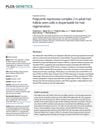 34 citations,
April 2018 in “EMBO journal”
34 citations,
April 2018 in “EMBO journal” The protein SLC1A3 is important for activating skin stem cells and is necessary for normal hair and skin growth in mice.
 32 citations,
July 2017 in “Wiley Interdisciplinary Reviews-Developmental Biology”
32 citations,
July 2017 in “Wiley Interdisciplinary Reviews-Developmental Biology” Transit-amplifying cells are crucial for tissue repair and can contribute to cancer when they malfunction.
 29 citations,
July 2014 in “PloS one”
29 citations,
July 2014 in “PloS one” Meis1 is crucial for skin health and tumor development.
 26 citations,
September 2018 in “Journal of Molecular Cell Biology”
26 citations,
September 2018 in “Journal of Molecular Cell Biology” Endoglin is crucial for proper hair growth cycles and stem cell activation in mice.
 26 citations,
July 2012 in “Biochimica et Biophysica Acta (BBA) - General Subjects”
26 citations,
July 2012 in “Biochimica et Biophysica Acta (BBA) - General Subjects” The review found that different stem cell types in the skin are crucial for repair and could help treat skin diseases and cancer.
 12 citations,
June 2020 in “Frontiers in Cell and Developmental Biology”
12 citations,
June 2020 in “Frontiers in Cell and Developmental Biology” The PP2A-B55α protein is essential for brain and skin development in embryos.
 11 citations,
November 2001 in “Journal of Chromatography B: Biomedical Sciences and Applications”
11 citations,
November 2001 in “Journal of Chromatography B: Biomedical Sciences and Applications” Finasteride and analogues separated using LC-MS-MS technique.
 11 citations,
January 2000 in “The Journal of Steroid Biochemistry and Molecular Biology”
11 citations,
January 2000 in “The Journal of Steroid Biochemistry and Molecular Biology” LY320236 is a strong blocker of two enzymes that change testosterone into dihydrotestosterone and might help treat conditions related to male hormones.
 10 citations,
May 2018 in “Nutrition and Cancer”
10 citations,
May 2018 in “Nutrition and Cancer” Certain spices may help prevent and treat skin cancer, but more human trials are needed.
 6 citations,
December 2021 in “PLoS Genetics”
6 citations,
December 2021 in “PLoS Genetics” Polycomb Repressive Complex 2 is not needed for hair regeneration.
 6 citations,
February 2016 in “American Journal of Dermatopathology”
6 citations,
February 2016 in “American Journal of Dermatopathology” The boy with woolly hair nevus had thinner hair and abnormal hair follicles, which improved with treatment but worsened when treatment stopped.
 September 2009 in “Pediatric Dermatology”
September 2009 in “Pediatric Dermatology” UVB is good for a skin condition in Asian kids, a lotion works for head lice, a drug helps with a skin blistering disorder, a foam reduces itchiness in skin inflammation, birthmarks can be more widespread, and criteria for a neurocutaneous disorder were agreed upon.
2 citations,
July 2017 in “Oncology Letters” Lacking cyclin D3 reduces skin cancer growth without affecting normal skin cell growth.
53 citations,
January 2013 in “Journal of toxicologic pathology” The project created a standardized system for classifying skin lesions in lab rats and mice.
16 citations,
November 2015 in “The journal of investigative dermatology/Journal of investigative dermatology” The enzyme DHHC13 is essential for healthy hair and skin, and its deficiency leads to hair loss and skin problems.
665 citations,
April 2016 in “Nature communications” Blocking specific proteins can help remove aging cells and might treat age-related diseases and promote hair growth.
9 citations,
November 2020 in “The FASEB journal” Intermediate filaments are crucial for cell differentiation and stem cell function.
 7 citations,
February 2022 in “Stem cell reviews and reports”
7 citations,
February 2022 in “Stem cell reviews and reports” Skin cells show flexibility in healing wounds and forming tumors, with potential for treating hair disorders and chronic ulcers.
 February 2018 in “Egyptian Journal of Radiation Sciences and Applications”
February 2018 in “Egyptian Journal of Radiation Sciences and Applications” Patients with Discoid Lupus Erythematosus have lower vitamin D and antioxidant levels and higher oxidative stress.
 11 citations,
January 2004 in “Exogenous dermatology”
11 citations,
January 2004 in “Exogenous dermatology” Outside factors like grooming, chemicals, and the environment can damage hair and cause disorders.
 2 citations,
April 2021 in “International Journal of Dermatology”
2 citations,
April 2021 in “International Journal of Dermatology” COVID-19 can cause skin issues like hives, rashes, and chickenpox-like eruptions, with women aged 31-40 being the most affected.
September 2009 in “MedEdPORTAL” The structured oral exam format is effective and well-received for teaching internal medicine.
 2 citations,
June 1997 in “The American Journal of Cosmetic Surgery”
2 citations,
June 1997 in “The American Journal of Cosmetic Surgery” Hair transplant megasessions are safe up to 1500 grafts but larger sessions have more risks and challenges.
 January 1982 in “Journal of The American Academy of Dermatology”
January 1982 in “Journal of The American Academy of Dermatology” Experts discussed treatments for skin conditions in children, emphasizing hydration, cautious medication use, and early intervention for infections.
 12 citations,
March 2011 in “Journal of pathology”
12 citations,
March 2011 in “Journal of pathology” Oncogenic K-ras causes rapid cancerous changes in the mouth's lining.
 6 citations,
September 1988 in “Drug intelligence & clinical pharmacy”
6 citations,
September 1988 in “Drug intelligence & clinical pharmacy” Minoxidil caused a severe rash in a patient, which improved after stopping the drug.
 1 citations,
January 2024 in “NPJ breast cancer”
1 citations,
January 2024 in “NPJ breast cancer” Experts agree on how to manage sugar levels and skin reactions in patients taking the cancer drug alpelisib.
 1 citations,
July 2001 in “Hair transplant forum international”
1 citations,
July 2001 in “Hair transplant forum international” The conclusion compares the effectiveness of different hair transplant techniques.
 January 2024 in “Journal of dermatology and skin science”
January 2024 in “Journal of dermatology and skin science” Topical aprepitant reduces skin rash and hair loss caused by cancer treatment.
 11 citations,
November 1990 in “Archives of Dermatology”
11 citations,
November 1990 in “Archives of Dermatology” A woman developed a persistent skin rash and hair loss from a condition linked to her increased L-tryptophan intake.
























